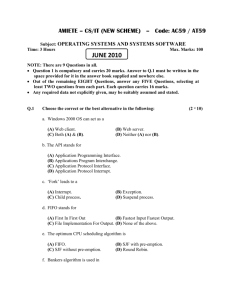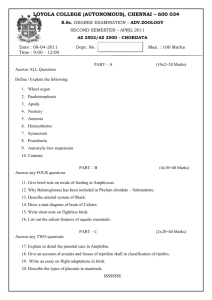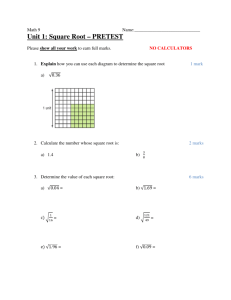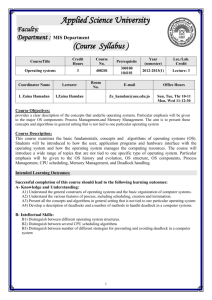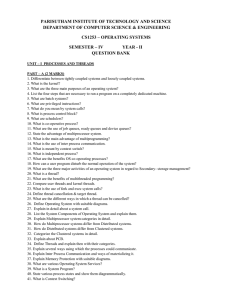Operating System
advertisement
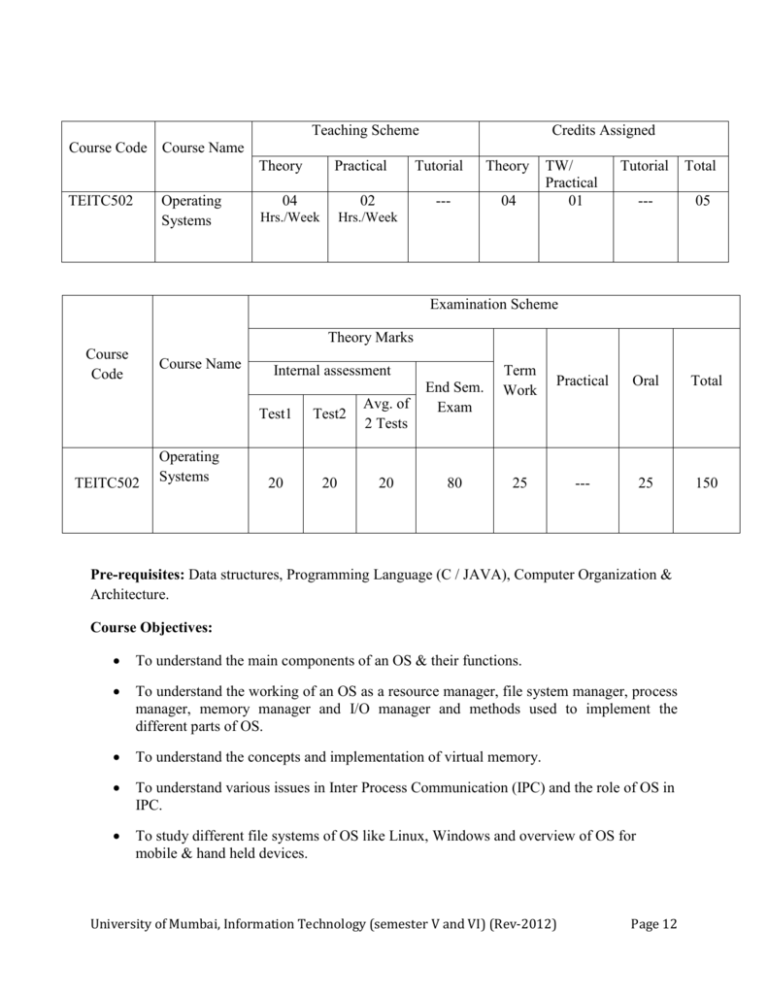
Teaching Scheme Credits Assigned Course Code Course Name Theory TEITC502 Operating Systems Practical 04 02 Hrs./Week Hrs./Week Tutorial Theory --- 04 TW/ Practical 01 Tutorial Total --- 05 Examination Scheme Theory Marks Course Code Course Name TEITC502 Operating Systems Internal assessment Test1 Test2 Avg. of 2 Tests 20 20 20 End Sem. Exam 80 Term Work Practical Oral Total 25 --- 25 150 Pre-requisites: Data structures, Programming Language (C / JAVA), Computer Organization & Architecture. Course Objectives: To understand the main components of an OS & their functions. To understand the working of an OS as a resource manager, file system manager, process manager, memory manager and I/O manager and methods used to implement the different parts of OS. To understand the concepts and implementation of virtual memory. To understand various issues in Inter Process Communication (IPC) and the role of OS in IPC. To study different file systems of OS like Linux, Windows and overview of OS for mobile & hand held devices. University of Mumbai, Information Technology (semester V and VI) (Rev-2012) Page 12 Course Outcomes: Student will learn important computer system resources and their management policies, algorithms used by operating systems. Student will understand what makes a computer system function and the primary PC components. Student will understand the working of an OS as a manager of various resources. Student will implement some of the functions of OS such as scheduling policies, page replacement algorithms, IPC. DETAILED SYLLABUS: Sr. No. Module Detailed Content Hours 1 Overview of Operating System Operating system objectives and functions, Evolution of OS, Characteristics of modern OS, Basic concepts: Processes, Files, System calls, Shell, Kernel architectures: Monolithic, Micro-kernel, Layered, Kernel mode of operations. 4 2 Process Management Process description: Process, Process States, Process Control Block (PCB), Threads, Thread management. 10 Process Scheduling: Types, Comparison of different scheduling policies. 3 Process Co-ordination Principles of Concurrency, Race condition and critical section, Mutual Exclusion- Hardware and Software approaches, Semaphores, Monitors, Message Passing, Producer Consumer Problem. Deadlock: Principles of Deadlock, Deadlock Detection, Deadlock Avoidance, Deadlock Prevention. Memory Management Requirements, Memory Partitioning, Virtual memory: Paging; Segmentation; Page replacement policies, page faults. 10 4 Memory Management 5 Input Output Management I/O Devices, Organization of the I/O Function, Operating System Design Issues, I/O Buffering, Disk Scheduling and disk scheduling algorithms, Disk cache. 6 6 File Management Overview, File Organization, File Sharing; Record Blocking; Secondary Storage Management. 6 7 Case Studies Producer Consumer Problem, Multithreading, RAID, File systems of Windows and Linux , Overview of Android OS. 6 University of Mumbai, Information Technology (semester V and VI) (Rev-2012) 6 Page 13 Text Books: 1. Modern Operating Systems, Tanenbaum, IIIrd Edition, PHI 2. Operating System-Internal & Design Principles, VIth Edition, William Stallings, Pearson 3. Operating Systems Concepts, Silberschatz A., Galvin P., Gagne G, VIIIth Edition Wiley. 4. Principles of Operating Systems, Naresh Chauhan, First Edition , Oxford university press. References: 1. Operating Systems in Depth, Thomas W. Doeppner, Wiley. 2. Operating System Programming and Operating Systems, D M Dhamdhere, IInd Revised Edition, Tata McGraw. 3. Operating Systems, Achyut S. Godbole, 2nd edition, Tata McGraw Hill. 4. Application development using Android, Hello, Android, mobile development platform, Ed Burnette, 3rd Edition. 5. Linux Command Line & Shell Scripting, Richard Blum and Christine Bresnahan, 2nd edition, Wiley. Term work: Term Work shall consist of programs based on the given list. Journal must include at least 2 assignments. Term Work Marks: 25 Marks (Total marks) = 15 Marks (Experiment) + 5 Marks (Assignments) + 5 Marks (Attendance) Oral Examination will be based on the above syllabus. Suggested Practical List: 1. Implementation of System Calls (at least five). 2. Implementation of CPU Scheduling Policies (both pre-emptive and non pre-emptive). 3. Implementation of Page Replacement Algorithms. 4. Implementation of IPC (Producer Consumer problem) . 5. Implementation of Multithreading. 6. Implementation of Deadlock Avoidance algorithm (Bankers algorithm). Theory Examination: Question paper will comprise of 6 questions, each carrying 20 marks. Total 4 questions need to be solved. Q.1 will be compulsory, based on entire syllabus. Remaining question will be randomly selected from all the modules. Weightage of marks should be proportional to number of hours assigned to each module. University of Mumbai, Information Technology (semester V and VI) (Rev-2012) Page 14


